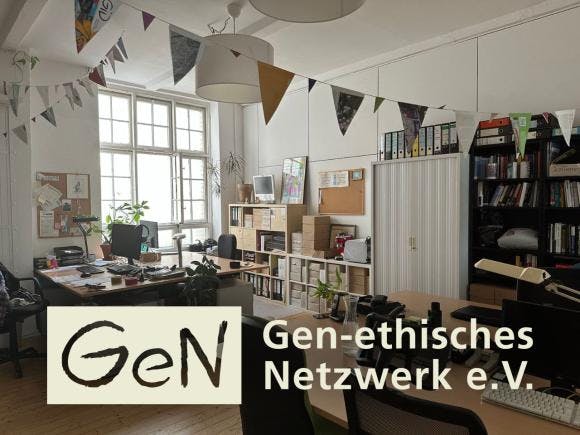

The GeN is a donation-funded association that prepares knowledge about bio, gene, and reproductive technologies for the interested public. In collaboration with feminist and ecological movements, we enable differentiated debates that place the societal impacts of these technologies at the center.
The GeN was founded in 1986 in response to the rapid development in biotechnological research by critical scientists, journalists, politicians, and other people interested in genetic engineering. The still primarily donation-funded association today consists of members, supporting members, the office team, the board, and a scientific advisory board. The office team is primarily responsible for shaping the content. It currently consists of five people who decide on the content and output in a grassroots democratic manner in consultation with the board. The centerpiece of the content work is the quarterly published specialist journal Gen-ethischer Informationsdienst (GID).
Our common goal is the education and information of the interested public (citizens, specialists, industry, and politics) on gene and reproduction technologies. We are convinced that a strong civil society is a fundamental part of a democracy. This requires opportunities for diverse and informed opinion formation of each individual. We want to contribute to presenting information transparently and understandably and making it accessible to all interested parties, even without specific prior knowledge.
In this context, we are committed against racism, ableism, and global inequality. Our perspective is always an intersectional-feminist one. We question health ideals, police state security promises, and the solution promises of the agricultural industry.
Our specific goals are
In Agriculture
In Medicine
To achieve these goals, we work with scientific and civil society initiatives as well as activists and jointly develop political demands. We maintain our political independence by being exclusively funded by members, donations, and projects. We engage in critical science communication, for which we use various formats and methods:
In our assessment and evaluation of the societal impacts of biotechnologies, we orient ourselves to evidence-based science, i.e., findings that have been achieved through a transparent and comprehensible methodology, and consider research results from various disciplinary perspectives. Our criticism addresses where societal power relations, political influences, and financial conflicts of interest demonstrably affect which research questions (how) are addressed and whether and how results from science are published, interpreted, and socially implemented. We incorporate the perspectives of those directly affected into our work and give them space, rather than just writing and speaking about them and their supposed needs. Our focus is on a radically interdisciplinary collaboration of social and other humanities scholars together with biologists and medical professionals. This allows us to assess the social, political, and ethical impacts of bio, gene, and reproduction technologies and to provide well-founded criticism where necessary.